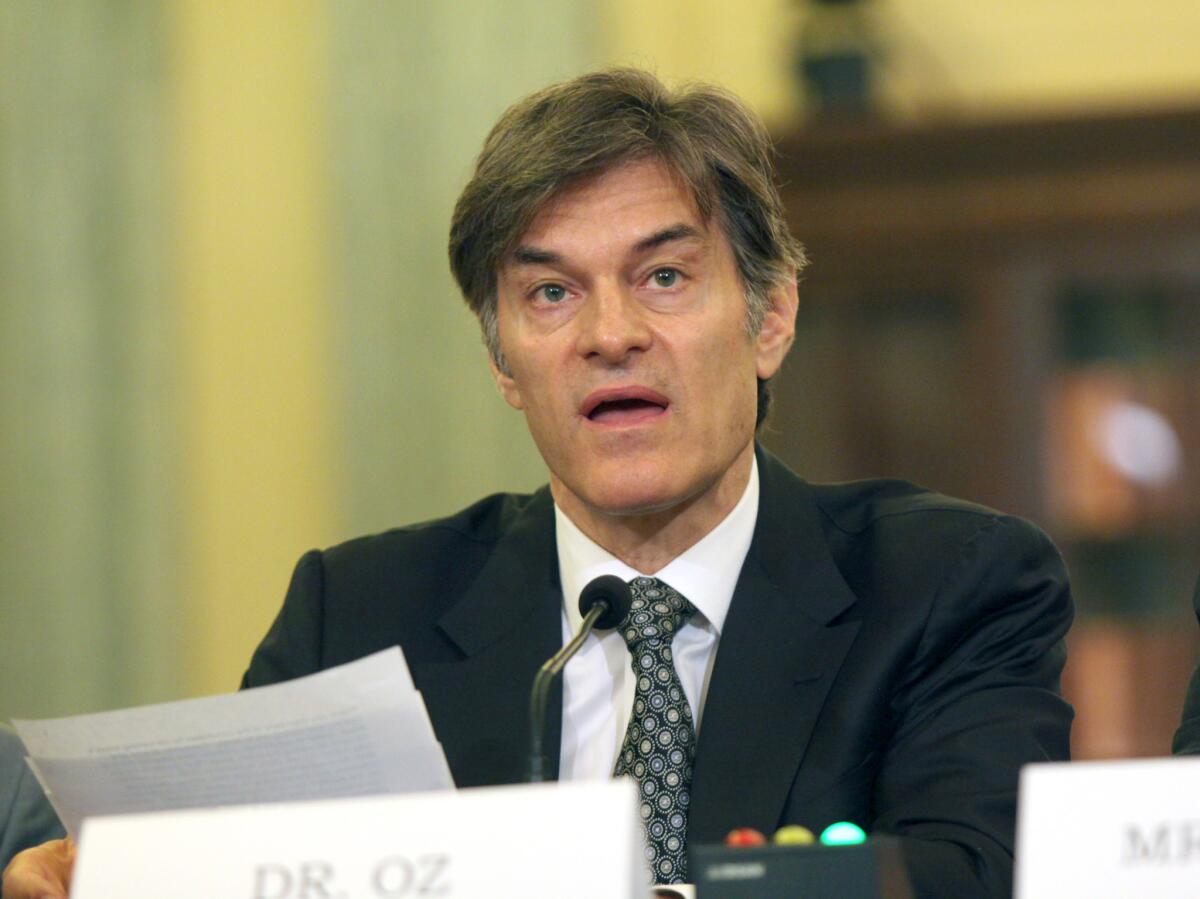John Oliver blasts Dr. Oz for ‘shameless pandering’

It’s been a tough week for Dr. Oz.
On Tuesday, the celebrity health guru faced tough questioning before a Senate subcommittee investigating the marketing of weight-loss scams, some of which Oz has featured on his syndicated talk show. Then on Sunday, comedian John Oliver devoted more than half an episode of “Last Week Tonight” to a highly critical segment about Oz’s “shameless pandering,” which contains some salty language. Oliver even enlisted celebrity friends George R.R. Martin and Steve Buscemi to the cause.
Oz has been known to tout the fat-fighting benefits of various dietary supplements on his show, using phrases like “miracle in a bottle” and “lightning in a bottle” to describe products whose efficacy is, at best, unproven. As a well-known and trusted physician, Oz wields an unusual amount of influence, and his endorsement of a product has been known to increase sales exponentially.
“What’s so wrong with that?” Oliver wondered. “Name me one case where a man named Oz claimed mystical powers and led people astray.”
Besides, Oliver insisted, Oz knows that there’s no such thing as a “miracle pill,” which is why he told the Senate subcommittee last week that “there’s not a pill that long term is going help you long term lose weight and live your best life without diet and exercise.”
So why then had Oz done things like touting green coffee bean extract -- a compound that may actually be harmful -- as “magic beans” on his show?
“Here’s the issue: Dr. Oz is a doctor and one with degrees from two Ivy League schools,” said Oliver, who wasn’t won over by Oz’s argument that he does “personally believe” in some of the products he plugs on his show, even though he recognizes that “often times they don’t have the scientific muster to present as fact.”
“That’s the whole point. You’re presenting it as a doctor,” Oliver replied, though he added that Oz is simply a symptom of the “shockingly unregulated” dietary supplement industry in the U.S. In one of the deep-dive reports that have already became his show’s signature, Oliver explained how the current state of affairs dates back to the early 1990s, when an effort to expand the FDA’s regulatory oversight of the supplement industry following the deaths of 38 people was soundly defeated, thanks to a wave of negative commercials (one of which starred vitamin proponent Mel Gibson) and generous political contributions to members of both political parties.
Returning to Dr. Oz, Oliver suggested that “perhaps his fatal flaw is that he’s done 870 daily, hour-long shows about health and medicine” and that, at that rate, “pretty soon you’re going to get sick of doing shows about what your poop should look like with Cameron Diaz.”
Still, he insisted, “it’s easy to fill a show with shameless pandering without dangerously misleading medical information” and proceded to do just that, speaking to “Game of Thrones” writer George R.R. Martin over Skype about nothing in particular, trotting out an adorable puppy, depicting a group of women in trashy dresses throwing wine at each other, shooting free T-shirts at his audience, and even introducing a tap-dancing Steve Buscemi.
“See Dr. Oz? We’ve done it. We engaged viewers without recommending any unregulated products that could potentially induce diabetes.”
But perhaps Dr. Oz isn’t feeling so down after all. Despite the mounting criticism, on Sunday he was named outstanding talk show host at the Daytime Emmy Awards.
Follow @MeredithBlake on Twitter.
More to Read
The complete guide to home viewing
Get Screen Gab for everything about the TV shows and streaming movies everyone’s talking about.
You may occasionally receive promotional content from the Los Angeles Times.






